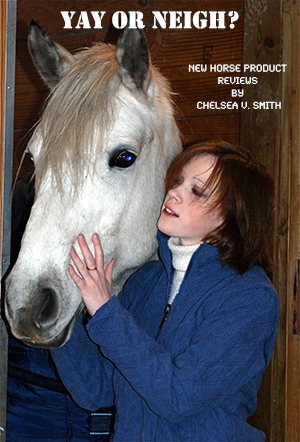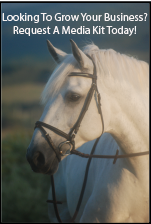Shift Your Perspective to a Better Ride
by Lisa Eklund
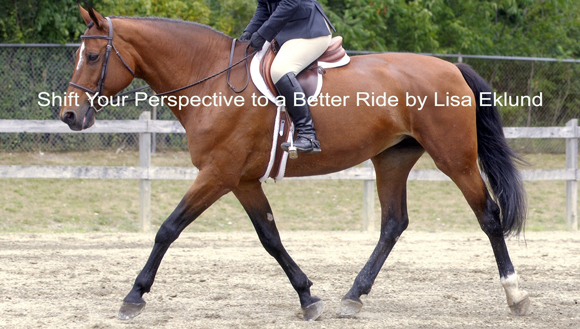
As I write this article it is brutally cold winter day with a temperature of -7° and a wind chill of -25°. I just got off Facebook after replying to a Canadian friend’s post that his wind chill is -29°. My reply was, “It’s a balmy -25 wind chill here.” He sent me an LOL and I replied again “It’s all about your perspective, Ha! Ha!” My friend understood what I meant as he is a faculty member at The International Coach Academy where I received my coaching certification. It is there that I learned about the importance of shifting our perspectives from different disempowering perspectives and to replace them with the empowering ones that can help us walk through life with an open, positive mindset. The best part about all of this is that shifting perspectives in riding is what I have been planning to write about. I wasn’t sure how to start the article until this fun Facebook interaction occurred. I thought "Here’s my introduction".
What is a perspective? It is a state of mind on how we view something. Often this something is fully out of our control, just like this cold winter day. What we do have in our control is our reactions to the situations we are in and the mindsets we maintain. My perspective today about the weather is a light and humorous one. I was able to make a joke about it and laugh instead of feeling miserable. Seems like a much better option to me! So what shifts can you make in your perspectives when you ride to enable you to have a positive, successful experience? There are many. I am going to talk about a few to help get you on your way to keeping an open mind that seeks more positive choices in response to your riding experience.
Move from a Negative to Positive Focus
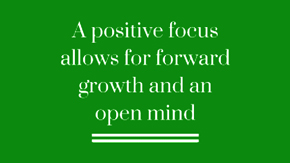 Do you latch onto what is negative in your riding and life? Think about what happens when that occurs. More than likely that negative focus brings on more negative results. If you are struggling in 20% of a ride and the other 80% is going well where is your focus? If you think only about the 20% and beat yourself up for it you will probably stay stuck in that issue and most likely your problems will grow. Imagine what would happen if your focus went to the 80% that was good and you remembered what you felt and what you did to make that happen. You would feel empowered by those successes and use them to help you improve the next time. A positive focus allows for forward growth and an open mind to understand and analyze mistakes, make constructive changes and build upon what is good.
Do you latch onto what is negative in your riding and life? Think about what happens when that occurs. More than likely that negative focus brings on more negative results. If you are struggling in 20% of a ride and the other 80% is going well where is your focus? If you think only about the 20% and beat yourself up for it you will probably stay stuck in that issue and most likely your problems will grow. Imagine what would happen if your focus went to the 80% that was good and you remembered what you felt and what you did to make that happen. You would feel empowered by those successes and use them to help you improve the next time. A positive focus allows for forward growth and an open mind to understand and analyze mistakes, make constructive changes and build upon what is good.
A trainer, helping to help support a rider in this perspective shift can ask what is going right with the ride instead of asking or telling them what they need to fix. This question often surprises a rider as they are so focused on what is wrong with their ride that they never think of what is right. They may take a big pause but they will eventually come up with the answer and feel empowered from this shift. It brings a sense of freedom to their thinking. They take the judgment out of their riding and shift to a calm, clear mindset that focuses on the big picture. As a rider ask yourself this same question and see what answers you get.
Letting Go of Perfectionism: Doing Your Best in each Moment is All You Need for Success
Are you someone who always wants perfection in everything you do? It is an admirable intention but impossible to achieve. Nothing is ever perfect. The path to perfection is covered with many disappointments and little success. When you strive to be perfect you live in self-judgment. You begin to see mistakes and failures as bad and you attach that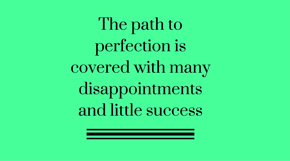 label to yourself. You often think you are bad and you stay stuck in a cycle of disappointment. If you can let go of being perfect you will begin to see all the opportunities your mistakes and failures can bring you. You will begin to use those opportunities to create change, growth and success. In order to break this cycle of perfectionism you need torecognize, accept and understand where it is coming from. Is it based in fear of being judged by others? Have you learned that being perfect is the only way to be? Have you been told that mistakes and failures are bad? Whatever the reason, once you begin to recognize the cause, you can begin to shift your beliefs and let go of being perfect. This mentality takes time and practice but as you see and feel the benefits it will become easier. You will learn to use your mistakes and failures as tools to create pathways to improvement and success.
label to yourself. You often think you are bad and you stay stuck in a cycle of disappointment. If you can let go of being perfect you will begin to see all the opportunities your mistakes and failures can bring you. You will begin to use those opportunities to create change, growth and success. In order to break this cycle of perfectionism you need torecognize, accept and understand where it is coming from. Is it based in fear of being judged by others? Have you learned that being perfect is the only way to be? Have you been told that mistakes and failures are bad? Whatever the reason, once you begin to recognize the cause, you can begin to shift your beliefs and let go of being perfect. This mentality takes time and practice but as you see and feel the benefits it will become easier. You will learn to use your mistakes and failures as tools to create pathways to improvement and success.
As a trainer you can support a rider during this process by asking them how they can use their mistakes to learn and grow. Give them the opportunity to create their own path to change. Instead of giving constant reminders of their mistakes and telling them what to do, ask them what is happening and what changes they can make. Give them permission for their changes to not always work. Let them know that when they change something they can analyze what is happening and keep what is working and let go of what isn’t without self-judgment. Little by little they will feel empowered and will develop an open mindset.
Letting Go of Control: Learning to Trust the Process
We often feel that if we can keep control of everything that we will be safe and all will be well. If we keep everything wrapped in a tight box we hope that mistakes will not occur and there will be no surprises. Unfortunately we can’t control everything. We really only have control of ourselves and the way we respond to situations. I use the word respond rather than react as a response happens after pausing and thinking, whereas a reaction is in the moment and has little thought attached. When a rider stays in such a tight structure they miss opportunities to learn from their mistakes and to try new things. A more receptive perspective enables a rider to develop feel, the most important skill a rider can have.
A controlling rider will go forth with a tight agenda that is not open to listening to the horse and the horse’s needs. There is no communication between the horse and rider as the rider has a demanding quality without feeling. This can occur off the horse as well in general horse care and management. Sometimes there is such tight control of everything to do with a horse that the horse is not able to be just a horse. The control around turnout, feeding, boots, blankets, bandaging and whatever else can put the horse in a protective bubble. Even with all of this control, both on and of the horse, unexpected things will happen. The reality is that things can and will fall apart. This can often send a rider and horse owner with a controlling mindset into a tailspin of anxiety and stress.
A shift of perspective to an allowing mindset with an understanding that a rider can only control themselves and how they respond to events in their lives, both on and off the horse, allows for a sense of freedom and lightness. A rider with this perspective can become a feeling rider as they will be open to hearing what the horse needs and they will adjust their riding accordingly. If a rider/owner has an allowing mindset, they can also begin to let go of such tight controls in their horse’s general care. When this tight control is relinquished, the horses are able to be freer in their day-to-day life and are therefore much happier and open when they are being ridden. Create an open space for communication between yourself and the horse.
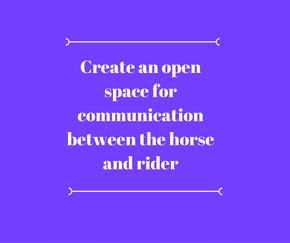
A trainer can help a rider learn to let go of too much control by asking thought-provoking questions. These questions would be ones that will help the rider understand what they expect to achieve by holding onto such tight control; further questions will let the rider discover what would happen when they loosen control. A couple of examples would be: “What lies behind your need to control every step of your horse’s ride?” After analyzing the answer, you may follow up with: “What might occur if you let go of such tight control and allowed the horse to have self-carriage?” As the riders listens to their answers they should be able to see the advantages of letting go of some of this control. As a rider, you can learn to sit quietly with yourself and your breath and ask yourself some powerful questions that have open ended answers. It will help you toward a freer and more feeling ride.
These are just a few of the disempowering perspectives we can carry with us in our lives and riding and the empowering perspectives that can replace them. The first and most important thing we can do in shifting from disempowering perspectives and beliefs to empowering ones, is to sit quietly with ourselves, look inward and be really honest. This is not always easy at first, but the rewards in the long run are well worth the hard work to shift and change our ways. As your perspectives change, the rewards will not only show up in your riding, but also in your day-to-day life. A performance or life coach can be a partner with you to support you in your journey. They will listen to you and ask powerful questions that will help you find the tools that work best for you in your journey.

